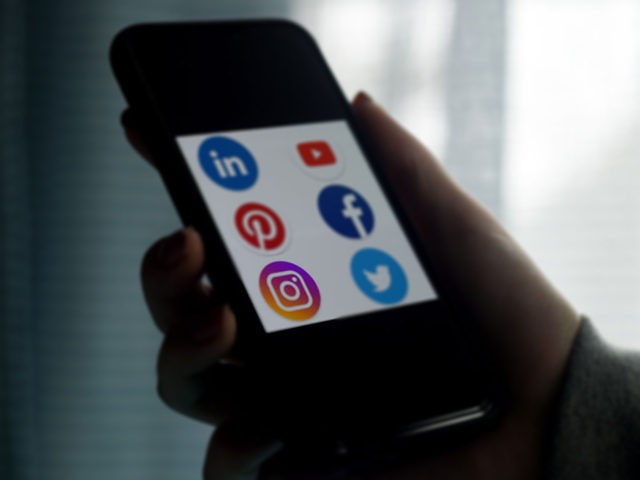Conservative lawmakers in Brazil have introduced at least three bills to limit the ability of social media companies to censor the nation’s political commentators, the nation’s O Globo newspaper revealed Wednesday.
The bills would deprive companies like Twitter and Facebook of having “the autonomy to follow their own usage policies,” according to the newspaper. The lawmakers behind the push told O Globo, however, that the bill would not take away social media companies’ rights to erase speech that is not constitutionally protected — such as death threats or other violent content — but merely protect all constitutional speech from undue censorship online.
The newspaper separately reported that President Jair Bolsonaro, a longtime critic of the left-wing bias of social media companies, will launch a global campaign to build a coalition of nations defending their sovereignty from the growing power of social media giants. Part of that effort will include a speech before the United Nations laying out a proposed plan for containing the corporations.
Bolsonaro’s victory in the 2018 presidential election was largely the product of effectively campaigning on social media, particularly after a self-proclaimed socialist attempted to assassinate him in September of that year, leaving the then-presidential candidate bedridden and needing several surgeries. The Bolsonaro team’s online campaign was a success despite Facebook shutting down dozens of pages and profiles of Bolsonaro supporters shortly before the runoff vote that determined the nation’s next head of state.
Conservative lawmakers, citing the recent censorship by YouTube of the conservative outlet Terça Livre, expressed concern this week that, without congressional action, social media censorship in the 2022 presidential election may result in a situation where companies like Twitter and YouTube can regulate the information Brazilians use to decide who to vote for. The removal of former President Donald Trump’s page from Twitter also caused alarm among conservative lawmakers, particularly after social media platforms removed posts by Bolsonaro regarding the Chinese coronavirus pandemic.
Youtube removed the official page of Terça Livre for allegedly violating its community standards on two occasions, receiving two “strikes.” Among the offending content was the publication of a video of President Trump delivering a speech.
Allan dos Santos, Terça Livre’s most high profile journalist, was among the victims of dozens of “fake news” raids organized by the socialist-led Supreme Federal Tribunal (STF), Brazil’s top court, in March 2020. The raids, which also targeted comedians and other content creators, were allegedly prompted by public criticism of the STF itself. It remains unclear what crimes the victims committed. Dos Santos has since relocated to the United States to avoid political persecution.
Following the censorship of Terça Livre last week, O Globo reported Wednesday that lawmakers have filed at least three bills “to limit the power of [social] networks to moderate content.” One of the bills proposed the use of the judiciary to decide if the censorship or removal of content from a network is legal. Another proposed to create a civil course of action for censored individuals if they can prove their content was removed because of opinions the network deemed unfavorable. The third preemptively bans social media companies from removing any content “in disagreement with the constitutional guarantees of freedom of expression, communication and expression of thought.”
Representative Daniel Silveira of the Social Liberty Party (PSL), Bolsonaro’s former party, drafted the third bill. He clarified to O Globo that his bill would not prevent all removal of content from social media pages.
“It was not proposed that they can’t remove [content],” he said. “They can, as long as there is a specific case that affected the legal and moral order. What has been happening is that these companies only act against profiles with political ideologies antagonistic to those of their CEOs.”
Silveira said in a separate comment to Terça Livre that legislative action is necessary because foreign companies “literally ignore” the Brazilian constitution without repercussions.
“They have a contract within a country [to abide] by current legal rules and they literally ignore it,” Silveira said. “Mainly, [they ignore] our constitution, which expressly guarantees freedom of expression. This cannot be tolerated in any way.”
The lawmaker added that concerns regarding free speech will become more acute as the road to the 2022 presidential election inches closer. Brazilians need to avoid allowing social media companies to disrupt their election “as they did in the United States.”
Bolsonaro himself is reportedly planning to make several public statements on the world stage to urge other countries to take similar action to protect their own safeguards against silencing speech. Bolsonaro’s planned speeches to the United Nations and the G-20 coalition will reportedly lay out three actions that nations should take to combat free speech censorship: condemnation of the censorship of Trump and other elected officials; the promotion of measures to prevent social media companies from “distorting public debate;” and the political resolve to force social media companies to choose an identity as either journalistic outlets that edit their content or open forums with minimal ability to silence users.

COMMENTS
Please let us know if you're having issues with commenting.